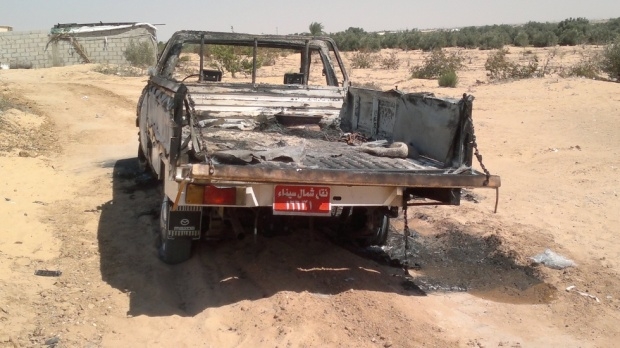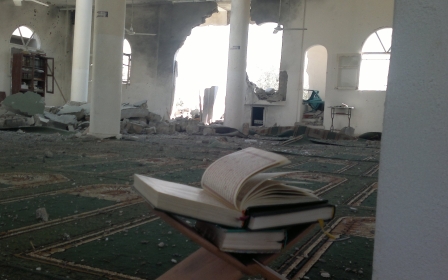Egypt security forces kill top militant leader in Sinai

Security forces in the Sinai peninsula killed the leader of Egypt's deadliest militant group, Ansar Beit al-Maqdis, along with three senior members overnight, officials said early Friday.
Several high-ranking security officials confirmed the death of Shadi el-Menei, considered to be the head of the Sinai-based Ansar Beit al-Maqdis (Partisans of Jerusalem), but it was not immediately possible to obtain confirmation from independent sources.
On Friday, the final day of campaigning ahead of next week's presidential election, two people were also killed in clashes between supporters of Egypt's ousted Islamist president Mohamed Morsi and security forces in Cairo and Fayoum, a town in the southwest.
In Sinai, the security situation has particularly deteriorated following Morsi's ouster last July.
Security forces opened fire on the four men as they were in a car in central Sinai and about to carry out an attack on a gas pipeline, officials said.
Stay informed with MEE's newsletters
Sign up to get the latest alerts, insights and analysis, starting with Turkey Unpacked
However, other security officials said Menei and five other members of the group were shot by unknown assailants.
Locals told Middle East Eye via phone that they were sceptical of the official narrative, amid what they say were contradictory statements.
This comes just a day after, the Egyptian army said that four militants had been killed and 25 others arrested, including two Palestinians, in security swoops in Sinai.
It also comes the day after an Egyptian police officer died of wounds sustained in a militant attack near Egypt’s border with Israel.
Two other Egyptian policemen were also wounded. No group has claimed responsibility for this attack yet.
Ansar Beit al-Maqdis
Militants have stepped up their attacks against security forces in retaliation to a state crackdown.
Ansar Beit al-Maqdis has claimed some of the deadliest and high-profile attacks on Egyptian security forces, including a failed assassination attempt against the interior minister in September.
The group is thought to have been founded primarily by Egyptians in 2011 after the uprising that toppled strongman Hosni Mubarak.
In recent months, the group has also seen support coming from the Nile Delta and some areas of Cairo, experts say.
Before Morsi's ouster, Ansar Beit al-Maqdis mainly targeted Israel, through attacks on gas pipelines supplying Israel and in January its fighters fired a rocket at Israel's Red Sea resort of Eilat.
In April, the US department of State had designated the group a "foreign terrorist organisation".
One of the militant group's founders, Tawfiq Mohamed Fareej, was accidentally killed in March, when a car accident set off a bomb he was carrying.
Most of the militant attacks have been taking place in the north of the mainly desert Sinai Peninsula, but militants have extended their reach to Cairo and the Nile Delta, carrying out a series of high-profile attacks in the heart of the capital.
A little-known militant group, Ajnad Misr (Soldiers of Egypt) has also claimed several attacks on police in Cairo.
The government says the militants have killed about 500 people, most of them security personnel.
On May 26-27, Egypt will hold a presidential election widely expected to bring to power ex-army chief Abdel Fattah al-Sisi, who ousted Morsi in July.
Sisi's only rival in the election is leftist leader and long-time opposition figure Hamdeen Sabbahi.
The supporters of retired field marshal Sisi see in him a tough leader capable of restoring security and reviving an economy badly hit by three years of turmoil.
But his opponents say that should he win the election, which they see as illegitimate', Egypt would see a return to autocratic rule.
Middle East Eye delivers independent and unrivalled coverage and analysis of the Middle East, North Africa and beyond. To learn more about republishing this content and the associated fees, please fill out this form. More about MEE can be found here.




